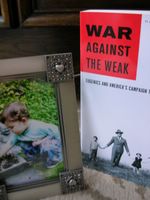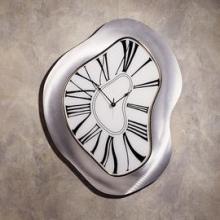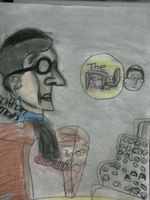Adversity’s sweet milk, philosophy.
William ShakespeareAwakening is process. Some people stay asleep their entire lives. Others have mini-awakenings and slip back into old habits and ways of being, simply because thinking outside of boxes seems impossible, and still others have major awakenings because of what life thrusts upon them. Whatever the cause, whatever the means, the point is to wake up.
This past week, I’ve had a series of conversations, with different people I know well, who have raised questions in me on how to advocate for autism, as it is most complex and challenges our everyday notions of how we live and raise our children. It also raises a personal issue in me about the meaning of friendship. A while ago, I wrote about advocation as the
Sledgehammer and the Song, stating we need both styles in advocating for the rights of the disabled. Back then, I was taking a softer stance, trying to be the song, and others with autism challenged me in a positive way. My awakening can be read right here on this blog, in black and white. Awakening begins with an agitation that something is not good enough, and the process of action takes a little longer to develop.
I’ve been gentle with friends who have hurt me with what seemed like harmless comments. Afterall, there was a life before Adam, and that kind of talk didn’t bother me then. Isn’t the onus on me to maintain the friendship as is? I’ve had to think long and hard about that one before writing about events that have shaped our family journey with autism. By my 41st birthday last week, I decided that life is too short and that honesty and writing my story is an important process for me and for others. It is also important to figure out who will continue to stand by me in these important moments that have come to define, in large part, who I am. If I continue to call people “friends,” and I give my time and my heart to them, then I need to make sure they know for what I stand. I like to think that if you are honest with someone, the truest friendship can spring forth, if of course, the person wants to stand with you, and we are all willing to listen to each other. I suppose if I am honest with a friend about how I feel their comments and behaviour have effected me, it means that I believe that that friendship has a possibility to grow into something much more profound. So too, I am open to hearing about all of my follies as much as another lovely friend lifted up her arm in mock breast examination mode and laughed, "Oh no! I've just found an emergent ideology!" It was funny and while I wouldn't call these ideas a cancer, I do claim they can often be more cumbersome than my monthly PMS.
“
Trouble is part of your life, and if you don’t share it, you don’t give the person who loves you a chance to love you enough,” said Dinah Shore. I like to think that autism isn’t trouble, but it is a fundamental shift in the way I've come to live.
Time has a lot to do with shaping opinion. It is doing a lot to slowly change the attitudes of people towards disability. In a conversation with a family member this past weekend, it left me considering the reality that advocates and people with disabilities are facing.
At a party on Saturday night, I grabbed my crantini, enjoying the people and approached a familiar face. She asked me what I was up to, and to be safe, I said “a little bit of this, a little bit of that,” shrugging it off as mindless party babble. I mean, I don't want impose my "emerging ideologies" at every single social event. Even I need a reprieve! But she probed me a little further, and asked if I would be organizing another exhibition. She got me going about the Canadian Autism Acceptance Network, the organization I am in the process of establishing to organize lectures and events that will change the message that autism does not necessarily need to be cured, but rather, needs to be supported and accepted.
“Why wouldn’t you want to give Adam a pill to cure his autism?” she looks at me as if I am a crazy, irresponsible parent.“To me that seems ridiculous,” she scoffs, drink in one hand, her other hand dismissing me with a quick flick in the air.
“It is not for me to decide. It is up to the person with autism,” I say. “People with autism say they do not want to be cured, they want to be accepted as they are.”
“Well what about the people who can’t decide? I think it is up to the parents,” she sums up quickly. “The child should not be a burden on the rest of the family.” I am not making this up, folks.
I am taking a couple of big swigs of my crantini and turn to Henry who is signaling me to cool down, knowing how passionate I tend to get. “Get me another would you?”
Her face is becoming ascetic, and she is on the attack. “It’s fine for you, you have the means to help Adam,” accusing me of sufficient resources, which translates into more respite, I suppose. “Consider all those people who don’t have the money to help their children,” assuming that they even need the kind of “help” she is inferring.
Of course I have to assume this family member possesses the following presumptions: that I hand over Adam to others, and that raising him is not an active process for me and, that other parents who have less means are incapable of raising children who are not “normal,” or more appropriately stated, challenged, without listening to hundreds of countless stories from them and the daily work they do. Like many of us who do not have to actively engage, she is full of arm-chair opinions.
I slowly begin to draw my sword, as her words have wounded me and I’m not one to cower. “That is why we need to fundamentally change attitudes about difference, so we can get supports in schools, in places of employment,” I try to say calmly, failing miserably, as the pitch of my voice gets a little higher and more intense.
“I don’t want my kids being held back by kids with special needs,” she said to my face. I manage to compose myself enough to think of a respectful response despite the kick in the stomach she just gave me.
“That’s a problem,” and then I get nasty, “because my kid just might be smarter than your kids,” ouch, really low blow. “I’m sorry,” I backpaddle quickly. “It’s just a point, I’m not saying your kids aren’t smart, but I believe it is a right, and is a necessity to mix people of differences so that we can transcend that kind of attitude.” My face is visibly red. She is saying, in essence, that Adam needs a pill to be cured of his autism, that I am an irresponsible parent for not wanting to cure him, and that people with autism should be aborted. She further assumes, perhaps, that like her, I am a couch philosopher, whose opinions come out of nowhere, and I don’t spend countless hours researching and thinking about this.
“I think people should be able to abort if they learn of disability or autism,” she starts again. “I believe people should have a choice. There are families who fall apart over these things.”
“I agree, there are some families who fall apart -- with these things and many other things, and in our culture, it seems ludicrous to not say that choice is a right. But I don’t think there is enough information about what the choices are.” When I was shuffled into a
genetic counsellor’s office, they told me the stats, but not anything about what
quality of life I would have. I assume also that most people out there fearfully believe that one’s quality of life disappears after having a child with a difference. If I had been told
autism when I was pregnant, I wouldn’t have known about the unique gifts and changes in my life that have resulted in Adam, and sadly, he may not be with us today. At this point, I would not change a thing accept the attitudes of people who will effect his life.
At another party, a friend asked me “Okay, people who are high-functioning say they don’t want to be cured, but what about those who are low-functioning?” This is a friend who always asks me frank questions, but I really want to correct her about the functioning issue. While in reality she is right, there are people with more and less handicaps in society, the issue has nothing to do with one’s personhood or inner life or level of intelligence. If we are going to define disability into spectrums, let us do so only in the name of providing supports.
“Some `low-functioning’ people are actually not what you think they are.” I am agitated with my own answer. It seems to be the only way I can segue into the tougher issues of simple acceptance, no matter what level of disability we're talking about. “If they find another means to communicate, like typing, you will discover that despite the challenges, they too do not want to be cured, but just accepted and supported for who they are. Also, a lot of issues you think are autism, aren’t autism. There are co-morbid issues like epilepsy.” But I haven’t gotten to the crux of the matter, and I do not know what it is like to be “severely” impaired, either. I only read the materials by those who are, and meet them, to learn what it might be like to
be them.
In terms of advocating for autism, making way for the final point, making autism more acceptable is how it manifests, and usually peters out there. “Einstein had autism,” is not intended to make Adam and people like him more acceptable to a society that has difficulty thinking outside the box. It is to say that there is so much human potential that remains untapped because people with disabilities are not presumed competent – they are judged for how they look, how they behave, and what they cannot do. If we continue to do this, we may be getting rid of all the Stephen Hawkings’ of the world. Likewise, those who are not like Hawking have a right to be here and have a right to find ways to enable their Identity and find personal fulfillment. I am a believer that just because one is severely disabled, doesn't mean they do not deserve to have a full life. Certainly, the onus is on the society-at-large to ensure that they can have it. For the rest of us, the assumption that they, the severely disabled, feel nothing but pain or are unaware and therefore sub-human, is a terrible assumption to make.
Yet another friend this past week read my blog and accused me of self-pity, despite the posts “
The Economy of Pity” and “
Now What?” I found that accusation a little surprising, actually. This is not a move to seek vendetta for any previous comments that may have hurt me. Instead, this is a dialogue that means so much to me, my son and to others. The point is to have others consider their embedded views and assumptions about disability. I retaliated in an email stating that accusing me of
self-pity is like saying the Jews
victimize themselves when they raise their own human rights issues and anti-semitism, no different than women
complaining about their equal rights, and not so unfamiliar in the example of African Americans fighting white
oppression.
Most people would prefer to sit comfortably visiting exhibitions, to view ability, savantism – the sensationalized view of the autistic so that it is at least understandable, dare I say, palatable. They would prefer to be inspired by my words of ability instead of suggesting that we all have to look at ourselves, our collective history, and how this effects our thinking and way of living. The latter requires active engagement by people never wanting, or needing based on circumstance, to actively engage. When another party, the Jews, the blacks, the gays, impose their desires as a community who feel entitled to the same respect and civil rights, and it touches us in the sense that we will be effected in how we live our own lives, where our money goes, and the semantics we use, many of us jolt negatively. The former method of advocacy, the more passive approach, is an easier one where one has to do nothing and the onus is on the disabled to prove themselves worthy to co-exist in a society dominated by so-called "normal" people.
There are inherent dangers purporting this kind of safe message so we don’t offend others. Yet there are millions of people who are differently-abled, who deal with prejudice and sereptitious, or “unintended” discrimination and prejudice every single day.
So I’ve taken my “awakenings” public. I consider every single day in whose name I do this -- if it will positively or negatively effect Adam. I’ve come to the conclusion that an awakening is a call to act. It is a moral obligation. Instead of confined within the walls of academia, universities, we need take the issues to the street --the reformed eugenics movement, medical genetics, bioethics, and the idea of perfecting ourselves -- all of this needs to be considered in how our endeavours in the name of consumerism and progress are still aimed at perfecting the human race. (Joan Rothschild,
The Dream of the Perfect Child):
“
By mid-twentieth century, eugenic discourse had shed its racist rhetoric and supporting genetic justification, thanks in part of evolutionary biologists and the realities of a post-Holocaust world. The movement gained a new respectability and was recast in positive terms, as seeking to improve the entire gene pool and de-emphasizing the coercive measures central to the old eugenics. A reformed eugenics rediscovered the role of the environment, which was joined to biology to bring evolution back into perfectibility discourse. But perfectibility discourse, as redefined by the scientists and reformed eugeniscists, still sought to use genetics to control procreation, now extended to control cultural evolution. The new eugenic rhetoric, however, had little connection to medical practise. It was not until medical genetics developed as a clinical specialty in the late 1950’s, providing physicians with new tools to identify and help prevent disease, that the door opened to introduce eugenics into reproductive practice. But, by the 1960’s, a new generation of doctors did not have a eugenic agenda. The irony was that, just as even a reformed eugenics lost its following, reproductive medical practise gained the tools to mark and weed out the imperfect, according to medically defined criteria.” (The Dream of the Perfect Child, p.52).
Let me move to
Orange Life, a magazine distributed by Canada’s national newspaper,
The Globe and Mail. The magazine is about fashion and beauty and dedicates a few pages to un-cited statistics, splattered artistically over its pages. I read the stats, thinking about the ideas of late, and one in particular jumps out at me: “1 in 10 would abort a child if they knew it had a genetic tendency to be fat.” Then another, “80 to 90% of women dislike the size and shape of their bodies.” “Canadians spend $5.3 billion on cosmetics annually.” “Americans spent just under $12.5 billion dollars on cosmetic procedures in 2004.” “Young girls have indicated in surveys that they are more afraid of becoming fat than they are of cancer, nuclear war or losing their parents.” This list goes on, within these glossy magazine pages that spead out pages of thin, lanky models with perfect skin anyway.
In 1947,
The World Health Organization defined “health” as coextensive with quality of life. Health was defined as “not merely the absence of disease, but a state of complete physical, mental and social well-being…. That definition which set no limits on the scope of health policy or health care, was widely criticized and, though it remains a piece of interagency political rhetoric, plays no scientific role even at that WHO.” (From
Quality of Life and Human Difference, David Wasserman, Jerome Bicekenbach, Robert Wachbroit). The authors argue that this definition assumes that the lives of people with disabilities is of low-quality -- that the treatment [by WHO] of the personal and social challenges of people with disabilities and health problems creates a demeaning impression of the impact of impairment. It is the basis for the “pro-choice” movement, as people assume it is “cruel” to bring a child with difference into the world, and that their quality of life is significantly impaired. Ultimately, the source of genetic research and identifying human genes is to reduce the cost of supports for the disabled, in the environment, in the schools, in the workplace – and therefore, to create a perfect, selected race.
I can’t tell you how many parents, friends, have said just as matter-of-factly to me that they don’t see how children with disabilities can be integrated with supports in schools with
their children. “It’s too expensive... it will require too many resources... teachers can’t handle it,” are common arguments I hear. In fact, as my family member said to me, most people believe that the disabled will pull their own children down. Yet, not everyone will say
that out loud.
I argue that we will achieve a more compassionate race. I argue that these ideas of success and achievement are limited, and people need not fear people of difference. Fear is best killed by familiaritiy, I always say. I argue that we all need to reconsider, as parents and people with disabilities or not, what quality of life really means and how we want to re-define it for future generations.
Near the end of the party and my week of last, I thought of drinking my worries,and all this adversity away. Then, I had a conversation with a family friend who has a child with Cerebral Palsy and it was like meeting with an old friend bathed in sunshine. Once you have a child with a challenge or “handicap” (a handicap means that the source of the problem is in the environment, not the person. It means that if I have hurt my leg and it is a requirement that I climb a staircase without a rail, I am handicapped), there is an innate understanding between people, who accept and love their children for who they are amidst a society that doesn't. Not all parents do this, but there are many I have met who do.
“How do people’s attitudes about disability affect you, has it effected your friendships?” I ask her.
“You get used to it,” she says. “Some friends will stick with you, others can’t handle it. You end up making new ones.”
“Hmmm,” I nod knowingly, cradling my last martini of the night.
“Last year P had a series of bladder infections because her teachers didn’t take her to the bathroom. We had to ask them to take her and now her infections are gone. They just assumed she didn’t have to go, but she won’t make a sound or verbalize unless you ask her. Advocacy becomes part of your everyday life.” She purses her lips and smiles. There is a little bitterness in the journey to acceptance as our intolerant society inflicts the exhaustion.
“She has such a sense of humour, P,” said the mother, "She's wonderful."
I am not just a parent with an opinion. I am a parent listening to people with autism, listening to them to guide me in the process of raising Adam, and in the very messages that need to be heard about good and bad science, how to teach, how to parent a child who feels and perceives differently from me, and who are defining what quality of life means for them. I like to think I have an informed and evolving opinion.
I ask all of my friends, even those with countering opinions, just to come and listen. This is not an attack. We are all at different points of awakening. It’s a process. There is a community of differently-abled people who want their “label,” their handicap, their disability, to be as commonplace as saying someone is black or white. The only purpose of the label should be to acquire the supports one needs to function and be accepted as just another human being in this world.
“Are you Estée?” a woman with a warm face approaches me on the dancefloor.
“Yes.”
“I just want you to know that your name came up in my book club when we were reading
A Curious Incident of the Dog in the Nighttime and someone suggested that we read your blog.”
“Really?” I am dumbfounded and a little tipsy from the three martinis I’ve downed with debates.
“I want you to know that I really enjoyed reading it. It is really important what you are saying.”
Now that, my friends, is the reason for all of this. Cheers and good-night.






















